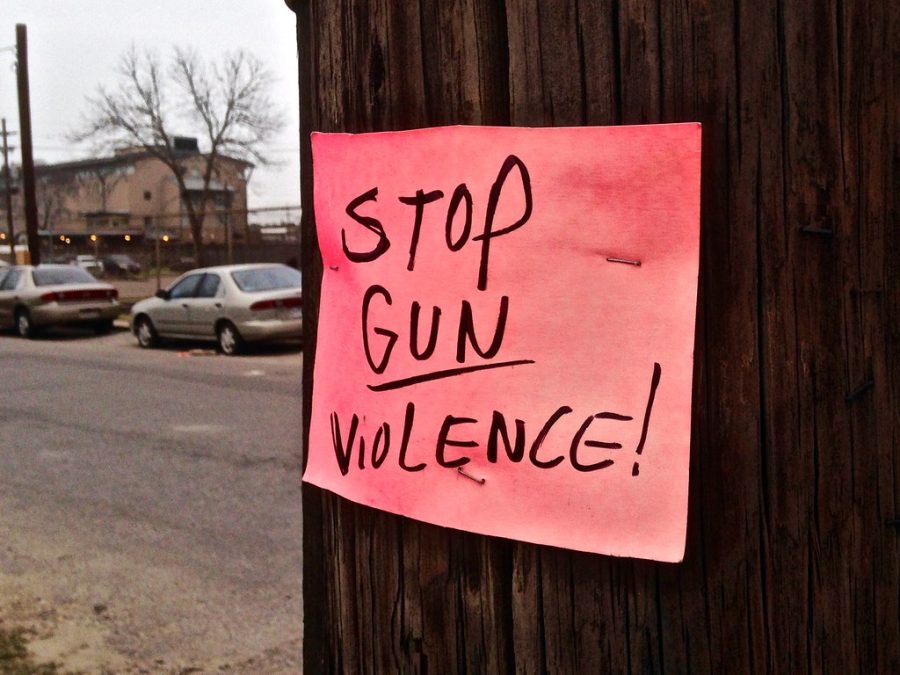Reforms for 45,000 U.S. Gun Deaths a Year
These two articles were written in Dave Marshall’s elective course, U.S. History through Current Events. After studying the history and current state of gun violence in America, students picked potential reforms and researched how effective they might be in reducing firearm deaths.
CONTENT WARNING: These articles discuss gun violence, mental health challenges, self-harm, and mass shootings.
Maxx Sovinski
Gun violence has proven to be a crucial problem in the U.S. 40,000 Americans each year die from various events such as mass shootings, homicides, and even suicides. Universal background checks have the potential to reduce U.S gun violence because they can keep guns out of the hands of dangerous people. One country that the U.S. can follow the example of is Japan because they have a longer and stricter process to getting a gun.
Universal background checks have the potential to reduce U.S. gun violence because there are still loopholes in getting a gun without background checks. If these loopholes are covered, then there will be a drastic decline in gun violence. For example, the New York Times article called How To Reduce Shootings by Nicholas Kristof says: “22% of guns are obtained without background checks.” These guns that are bought without background checks come from gun shows, private sales, or online. WAMU 88.5’s article called Do Universal Background Checks Prevent Gun Violence? says, “The RAND Corporation recently did an analysis of 18 different gun control policies and evidence that universal background checks decreased both violent crime including homicides and suicide rates.” This is important because even when the U.S. government implemented mandatory background checks for gun purchases with a licensed dealer, there are still ways to obtain guns. This could lead to the possibility of people getting hurt or the buyer hurting themselves. Universal background checks have been proven to reduce gun violence.
Japan has shown that it can be a good example to follow for the U.S. because they have several rigorous steps in attaining a gun. Some of these steps consist of passing various written, mental, and drug tests and a careful background check. Japan has, arguably, some of the highest gun restrictions in the world and they have one of the lowest homicide rates in the world with one just one death in 2017. The Council of Foreign relations article titled U.S. Gun Policy: Global Comparisons by Jonathan Masters says: “The only guns permitted are shotguns, air guns, guns with specific research or industrial purposes, or those used for competitions. Furthermore, owners must inform the authorities of how their weapons and ammunition are stored and provide their firearms for annual inspection.” The New York Times article How to Buy a Gun in 16 Countries also explains, “You must apply for firing training which can take up to a month and take a one-day firing and safety test. Apply for a gunpowder permit. After all of these tests and requirements, you must also take another additional background check.”
Japan is a safer country compared to the U.S. because of its strict gun laws and the long process it takes to obtain a gun. If the U.S. were to have gun laws as strict or similar to those of Japan, there wouldn’t be 40,000 people dying every year from gun violence. The number of lives that can potentially be saved from making this process a little more rigorous is absolutely unimaginable.
Mingcan Li
In the United States, the gun suicide rate ranks among the highest globally. According to the data provided by The Education Fund To Stop Gun Violence, the organization to stop gun violence in the U.S., approximately 24,000 people committed suicide by firearms in 2019. This number of suicide death accounts for more than 60% of total death by firearms. It is clear from this data that the Brady Act, enacted in 1993, did not effectively address the problem of gun suicides in the United States. To lower the gun suicides rate, the United States government should implement more rigorous and universal background checks.
The current federal background checks law has many loopholes that allow people who have criminal records, histories of domestic violence, and mental health problems to buy firearms. Based on the Brady Act, anyone who wants to purchase firearms from a federally licensed firearms dealer must undergo background checks. This act prohibited people who have threatening issues from buying firearms through gun shops, and nearly 3 million purchasers’ requests were rejected during the process from 1994 to 2015. People who cannot purchase firearms through gun shops turn to private sales and online gun markets that do not require any background checks. In 2015, research done by Matthew Miller, Lisa Hepburn, and Deborah Azrael shows that 22% of gun owners who purchased their firearms in the past two years did not undergo background checks. Since few laws restrict the private gun trade, some online gun markets advertise the “advantage” of letting people obtain guns in minutes without background checks. The universal background check is not uniform from state to state. Before 2020, gun traffickers purchased plenty of firearms from Virginia and sold them in northern states which have stricter gun laws. Because gunrunning between these states is too frequent, people called the trafficking route the “Iron Pipeline.” However, after Virginia lawmakers implemented state universal background checks, inter-state trafficking decreased by 29%. More than 90% of Americans agree that having more rigorous and universal background checks is essential. Josh Horwitz, the executive director of the Education Fund to Stop Gun Violence, said, “Stopping gun violence requires a myriad of solutions. There is not one bill or law that will magically save every life. But for policies to be successful, we must have universal background checks. Background checks are the foundation upon which other policies must build”.
By imposing more rigorous and universal background checks, people who have mental health issues will not be able to purchase firearms, which can lower the risk of gun suicide. Attempting suicide by using firearms is the most lethal method. The data shows that 9 of 10 Americans’ attempted suicide by firearm resulted in death. However, in instances where people failed to commit suicide and received subsequent help, there is a 90% chance that the person will not attempt suicide again. Another statistic provided by Harvard University was that more than 60% of people who attempted suicide said the suicidal impulse only lasted for 5 minutes to 1 hour. If the background checks limit the chance to buy a firearm during that difficult period, they may temporarily or permanently delay their suicide attempt.
As long as there is a firearm transaction taking place, there should be a background check at the same time. In background checks, examinants should carefully investigate each purchaser’s criminal record, health status, mental health status, and potential risk factors. They should stop patients with mental illnesses from acquiring firearms. People’s lives are at stake in every file that examinants review. The stricter the background check, the more people will be saved from gun violence.




























